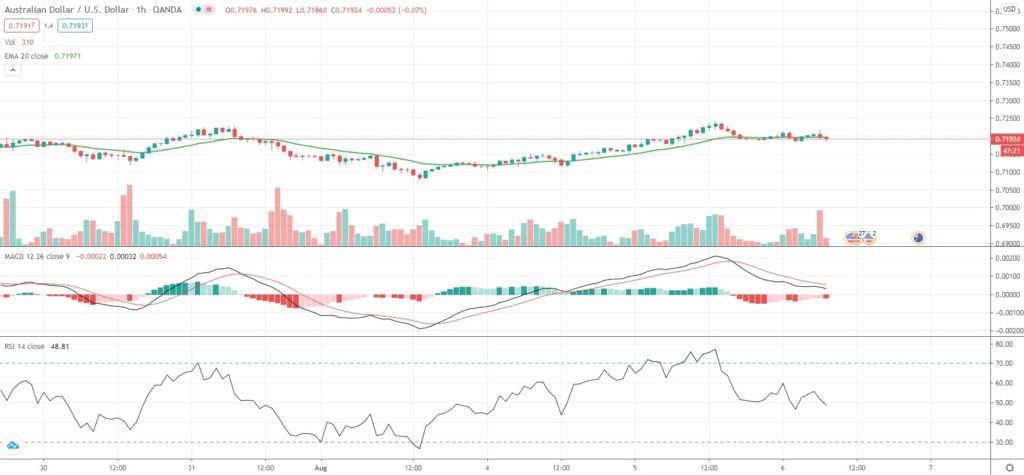AUD/USD was gaining ground for a third straight trading day on Thursday, while being not far from Wednesday’s 18-month high, as investor concerns that economic recovery in the US may lag other countries due to rising new COVID-19 infections continued to pressure the greenback.
Markets now await the official US job figures from the Labor Department after a report by ADP yesterday showed private payrolls had risen at a much slower pace in July than anticipated, which raised certain concerns about the upcoming Non-Farm Payrolls report, due out on Friday. Private businesses in the country hired only 167,000 workers last month, which compares with a median analyst estimate of 1.5 million.
A separate report by the Institute for Supply Management also showed that hiring in US services sector had decreased in July, despite that overall activity had gained traction.
Since over 30 million people in the US remain on jobless benefits, a recovery in employment is essential for overall economic activity in the country, while market players are expecting an agreement on another fiscal stimulus.
“The global economic revival underway is one where the U.S. lags not leads the rest of the world. It implies a weaker USD,” Ray Attrill, head of Forex strategy at NAB, said.
“Our forecasts have been revised to reflect our increased conviction that the recent weakening in the USD is ‘for real’ and has a fair way to play out over the coming couple of years at least.”
Attrill now expects AUD/USD to appreciate to 0.7400 by the end of 2020, an upward revision from 0.7200 expected previously, and to 0.7800 by the end of 2021, a revision up from 0.7500 previously.
Meanwhile, negotiations between White House officials and congressional Democrats on new coronavirus relief legislation continue with no sign of an agreement yet.
“I expect a deal will be reached before the Congress will adjourn on Aug. 10. So far there are few signs of compromise, leaving markets unable to react,” Masafumi Yamamoto, chief currency strategist at Mizuho Securities, said. Yamamoto added that a potential agreement between the two sides could trigger a rebound in USD.
As of 6:57 GMT on Thursday AUD/USD was inching up 0.07% to trade at 0.7196, while moving within a daily range of 0.7184-0.7217. Yesterday it climbed as high as 0.7241, or its strongest level since February 6th 2019 (0.7246). The major pair advanced 3.48% in July, which marked its fourth consecutive month of gains. It has risen 0.71% so far this week.
In terms of economic calendar, at 12:30 GMT today the US Labor Department will report on jobless claims. The number of people in the country, who filed for unemployment assistance for the first time during the business week ended July 31st, probably eased to 1,415,000, according to market expectations, from 1,434,000 in the preceding week.
Data for the week ended July 24th brought the total number of claims reported since March 21st to 54.1 million.
Bond Yield Spread
The spread between 2-year Australian and 2-year US bond yields, which reflects the flow of funds in a short term, equaled 16.0 basis points (0.160%) as of 6:15 GMT on Thursday, up from 15.1 basis points on August 5th.
Daily Pivot Levels (traditional method of calculation)
Central Pivot – 0.7195
R1 – 0.7237
R2 – 0.7282
R3 – 0.7324
R4 – 0.7365
S1 – 0.7150
S2 – 0.7108
S3 – 0.7063
S4 – 0.7017






